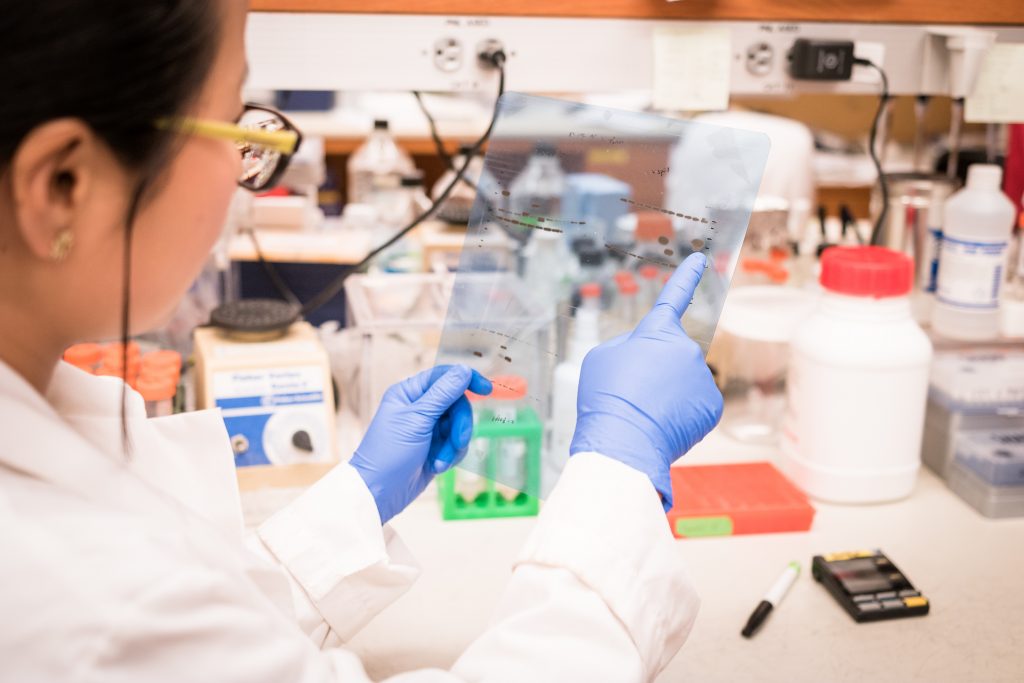
The Environmental Sustainability Projects Legacy After Two Years
In September 21, Ruth Grady and Maggy Fostier added the Environmental Sustainability Projects (ESPs) to our portfolio of final year research projects, to recruit students to help with our initiatives to become more sustainable.
Students are prepared with a programme in semester 1 of weekly live workshops and online resources (see diagram) concomitant with undertaking a Biosciences focused study of either harmful agents or processes for the environment (e.g. microplastics, toxins, manufacturing of lab coats, causes of biodiversity loss), or a review of new technologies/products/concepts developed to improve sustainability. Students move on to their actual projects in the second semester. We work in collaboration with the University’s central waste services and key members of the FBMH Sustainable Lab network.
We had 3 students in 2021-22, 14 in 2022-23, and we have 18 this year. 5 students have already produced work with clear impact.
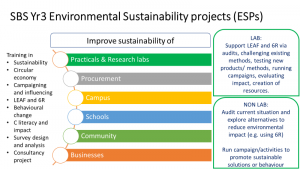
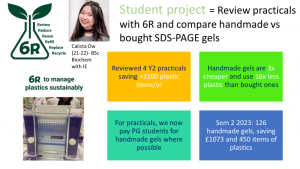 Calista Ow (21-22) worked with Maggy Fostier and 20 academics, postdocs and technicians, to review four Y2 biochemistry practicals with the 6R guide. She recommended actions to save >2100 items of plastic a year, which have been implemented since. She also realised that there were 3 main practices around SDS-PAGE gels and explored which was the most sustainable. She determined that for 20 gels, hand-cast gels are 3x cheaper and generate 16x fewer plastic items than bought ones. Her survey of 84 scientists established the pros and cons of each option and her blind test revealed the hand-cast gels produced better results (details in this presentation). We have since employed two experienced PhD students to cast the 126 gels needed for the semester 2 practicals saving >£1000 and 450 plastic items each year and all academics are very satisfied with hand cast gels for both straight SDS-PAGE and Western blots.
Calista Ow (21-22) worked with Maggy Fostier and 20 academics, postdocs and technicians, to review four Y2 biochemistry practicals with the 6R guide. She recommended actions to save >2100 items of plastic a year, which have been implemented since. She also realised that there were 3 main practices around SDS-PAGE gels and explored which was the most sustainable. She determined that for 20 gels, hand-cast gels are 3x cheaper and generate 16x fewer plastic items than bought ones. Her survey of 84 scientists established the pros and cons of each option and her blind test revealed the hand-cast gels produced better results (details in this presentation). We have since employed two experienced PhD students to cast the 126 gels needed for the semester 2 practicals saving >£1000 and 450 plastic items each year and all academics are very satisfied with hand cast gels for both straight SDS-PAGE and Western blots.
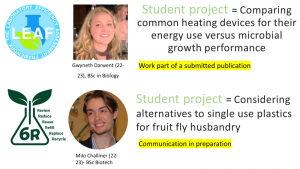 Gwyneth Darwent (22-23) worked with Danna Gifford to compare common heating devices (incubator, waterbath, thermomixer) for their energy use versus microbial growth efficiency of three micro-organisms at various temperature. Her findings are now part of a manuscript submitted for publication.
Gwyneth Darwent (22-23) worked with Danna Gifford to compare common heating devices (incubator, waterbath, thermomixer) for their energy use versus microbial growth efficiency of three micro-organisms at various temperature. Her findings are now part of a manuscript submitted for publication.
Milo Challiner (22-23) worked with Andreas Prokop and Sanjay Patel and liaised with groups in the UK and US to establish the cost and impact of using single use plastic vials and bottles for fruit fly husbandry versus the REUSE alternatives implemented in other Institutions. His findings make a case for reuse which we now need to consider in practical terms. A manuscript is in preparation.
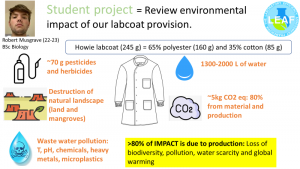 Robert Musgrave (22-23) worked with Maggy Fostier to establish the cost and impact of buying new lab coats each year for our Year 1 intake of undergraduate students and explored alternative scenarios. His findings make a clear case for REUSE. The lab coats are made of 65% polyester (plastic) and 35% cotton and >80% of the environmental impact comes from raw material and production. Reusing 900 labcoats a year in SBS will save 63 kg of pesticides/herbicides and 18 million litres of water (>7 Olympic pools), which become heavily polluted after use and damage biodiversity in soil, rivers and coastal mangrove areas. It will also save 3600 kg CO2 eq (same as driving halfway around the equator). Laundering the labcoats after the last practical of the students will be cheaper than buying new ones, and employing undergraduate or PhD students to collect, bag and sort the labcoats. This case study can also be applied to medicine and pharmacy, together saving the purchase of 2000 unnecessary labcoats/year. With support from the head of education from each school, an ESP student will implement the strategy this year starting with SBS and calculate the impact.
Robert Musgrave (22-23) worked with Maggy Fostier to establish the cost and impact of buying new lab coats each year for our Year 1 intake of undergraduate students and explored alternative scenarios. His findings make a clear case for REUSE. The lab coats are made of 65% polyester (plastic) and 35% cotton and >80% of the environmental impact comes from raw material and production. Reusing 900 labcoats a year in SBS will save 63 kg of pesticides/herbicides and 18 million litres of water (>7 Olympic pools), which become heavily polluted after use and damage biodiversity in soil, rivers and coastal mangrove areas. It will also save 3600 kg CO2 eq (same as driving halfway around the equator). Laundering the labcoats after the last practical of the students will be cheaper than buying new ones, and employing undergraduate or PhD students to collect, bag and sort the labcoats. This case study can also be applied to medicine and pharmacy, together saving the purchase of 2000 unnecessary labcoats/year. With support from the head of education from each school, an ESP student will implement the strategy this year starting with SBS and calculate the impact.
The findings of these 4 students will be disseminated to the LEAF (Laboratory Efficiency Assessment Framework) champion community in Manchester and other member institutions in the UK.
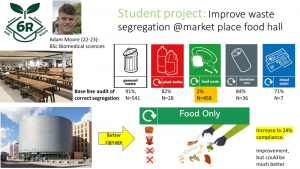 Finally, Adam Moore (22-23) worked with Silke Conen and our central food on campus and waste managers to improve waste segregation in marketplace food hall. Working with sustainability champion volunteers, they observed users disposing of their waste and noticed only 2% compliance for food waste disposal, mostly stemming from a confusing signage. Adam trialled 3 interventions and better signage led to an increase in compliance to 24%. This action will be followed in the next few weeks by UG volunteers running an information campaign in the food hall, hopefully increasing compliance further.
Finally, Adam Moore (22-23) worked with Silke Conen and our central food on campus and waste managers to improve waste segregation in marketplace food hall. Working with sustainability champion volunteers, they observed users disposing of their waste and noticed only 2% compliance for food waste disposal, mostly stemming from a confusing signage. Adam trialled 3 interventions and better signage led to an increase in compliance to 24%. This action will be followed in the next few weeks by UG volunteers running an information campaign in the food hall, hopefully increasing compliance further.
To find out more about Environmental Sustainability: visit the Faculty’s intranet page, website or contact srbmh@manchester.ac.uk. For more information on Environmental Sustainability at the University watch this short film or visit their website.

0 Comments